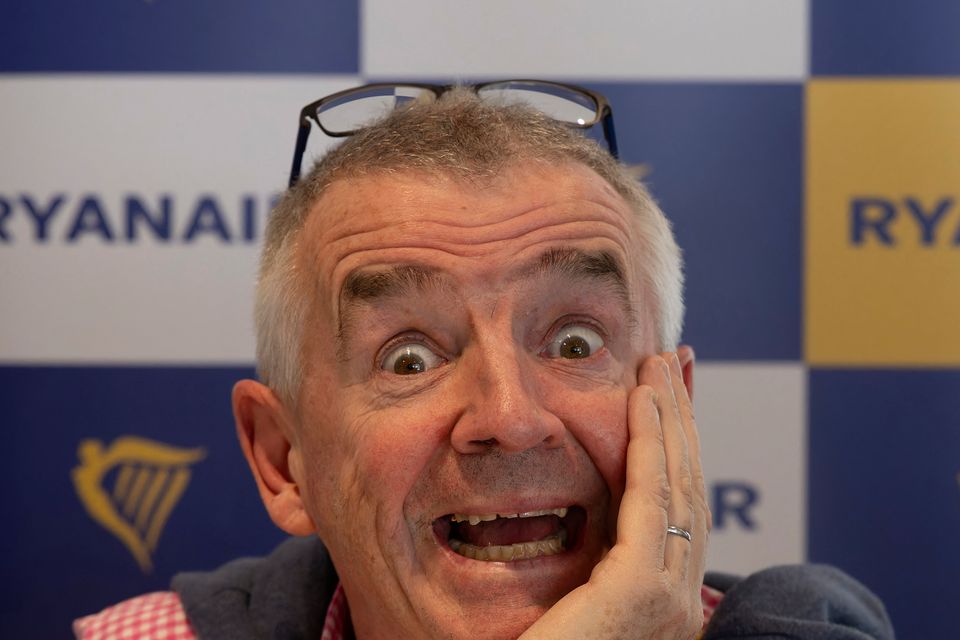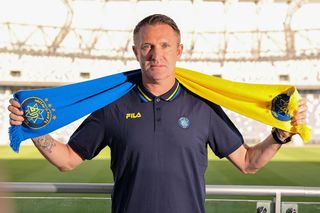Ryanair boss Michael O’Leary: ‘I’m like Pep Guardiola – I deserve my €100m pay deal’
Ryanair’s Michael O’Leary attributes much of his success at the airline to his accounting background. Photo: Getty
Ryanair boss Michael O’Leary has defended his proposed €100m bonus by comparing himself to football managers Pep Guardiola and Jurgen Klopp.
The outspoken airline chief said it is unfair that lucrative payouts for corporate bosses spark such anger given the lack of scrutiny around the vast sums paid to Premier League managers.
Not that Mr O’Leary, a Manchester City fan since boyhood, disagrees with Guardiola’s pay packet. Rather, he is simply readying his defences as his own windfall looms.
Today's News in 90 seconds - 29th April 2024
The payout will be triggered if Ryanair’s share price, currently at €20.36, hits a threshold of €21 and stays there for 28 days.
“If I do get it [the €100m bonus], all the city types will be railing against excessive executive pay and I’m not putting up with any of that mewling nonsense,” Mr O’Leary said.
“Footballers are getting half a million a week. Pep, who I think is a genius and deserves every penny, is getting £25m a year, Klopp too − and nobody says boo.
“Yet some guy running a serious business employing 20,000-plus people gets paid £5 or £10m and it’s suddenly excessive.”
Mr O’Leary said the prospective sum should be viewed not as a once-off reward but as payment for five or more years of work in expanding Ryanair − which has established itself as the dominant player in European short-haul aviation.
The Ryanair boss is also irked by the fact that the share-option scheme is often referred to as a bonus, arguing that “it is the shareholders who pay it, not the company”.
“If you turned round to any investor, as we did with ours, and said, ‘The share price is €11, if we double it to €21 would you give me options over €10m?’ then every one of them would do it,” he added.
Read more
When the share plan was announced in February 2019, the airline industry had completed its recovery from the global financial crisis and passenger numbers were hitting an all-time high. It was long before a global pandemic nearly killed the industry altogether.
At the time, Ryanair itself wasn’t in quite such rude health, with the airline having issued two profit warnings in the previous four months, its wings clipped by high oil prices, a fare squeeze and a stand-off with striking workers.
However, the rewards plan was accompanied by a contract extension for Mr O’Leary when many in the industry were speculating that he might even be forced to stand down.
In order for Mr O’Leary (63) to hit the jackpot, Ryanair’s annual earnings must surpass €2.2bn or its shares trade above €21 for 28 straight days, with both metrics required to effectively double in value compared with their 2019 levels.
Ryanair has issued options for 10 million shares to the chief executive at a strike price of €11.12, which he can buy should either target be attained. The difference between that number of shares at the two prices is €99m.
The incentive scheme was originally expected to expire in 2024 but was extended by four years some 18 months ago when Ryanair’s share price was languishing below €13 post-pandemic.
Mr O’Leary, a Grand National and Cheltenham Gold Cup-winning racehorse owner, probably won’t be getting his money on the basis of profit performance, with the airline guiding for a figure of about €1.9bn after tax for the year that ended on March 31.
He said there’s a “reasonable prospect” of hitting the profit target in fiscal 2025 as Ryanair seeks to carry 200 million passengers for the first time, unless “the bats in Wuhan suddenly take off again”.
But by then the firm’s share price is already likely to have seen him over the line. The stock first pushed through the €21 barrier in late March and has bubbled near that point ever since, without racking up the required four weeks above that level.
Possible controversy over the size of the payout has already been touted, with shareholder advisory service PIRC claiming in 2019 that Mr O’Leary should be “sheepish” about accepting it.
By any measure Mr O’Leary, while known for his F-bomb-laden rants and a belief that if fares are low then good customer relations are largely irrelevant, is a titan of aviation.
Some even go further by claiming he is quite possibly the most important European airline chief of his generation.
Since he took over in 1994, Ryanair and its no-frills peers, EasyJet and Wizz Air among them, have transformed the landscape of short-haul flying. They’ve stripped market share from veterans of the industry such as British Airways and Lufthansa, opened swathes of Europe to overseas tourism for the first time and invented the city break in the process.
The carriers have also become hugely influential with the likes of Boeing, so much so that the US manufacturer produced a high-capacity version of its 737 Max just for Ryanair.
Mr O’Leary took his inspiration from Southwest Airlines, having travelled to Texas to meet its founder Herb Kelleher, regarded as the grandfather of low-cost aviation, early in his Ryanair career. The penny dropped after he saw the carrier prepare a plane for its next flight in just 25 minutes, shaving almost an hour off the typical turnaround time in Europe.
Mr O’Leary acknowledges that his company is now mature and no longer the disruptive new kid on the block.
“We’re growing sensibly. If we keep costs down, keep airfares low and keep the price between us and other airlines widening, the business will continue to thrive,” he said.
For someone so outspoken, Mr O’Leary is uncharacteristically disarming when pondering the secret of his success. He said much of it is simply down to his background as an accountant, and his ability to repeat the same successful processes over and over without becoming distracted.
In fact, he argues that many companies and perhaps the world in general would be in better shape if accountants were allowed to make more of the big decisions.
Mr O’Leary also contrasts his own background in finance, having studied business and economics at Trinity College and trained as a tax accountant at Stokes Kennedy Crowley, with that of many other airline leaders.
“Airlines for many years were run by former pilots, who were only interested in flying the next toy. What we’ve demonstrated at Ryanair is that you put the accountants in charge and it will be dull, boring and repetitive, but actually, we’re very good at delivering,” he said.
“You should put accountants in charge of the world. It will be dull and boring but they will do the detail and they will do the execution. We’re a much-maligned species.”
As for his proposed bonus, the €100m coming his way would certainly put him in a league of his own when it comes to pay, even if he jokes that financial institutions may co-ordinate a mass sell-off “just to spite me”.
Yet, like Guardiola and Klopp in the Premier League, the Ryanair boss insists he is more focused on results than the prospect of a payout: “I don’t get that upset about it.”
Join the Irish Independent WhatsApp channel
Stay up to date with all the latest news















